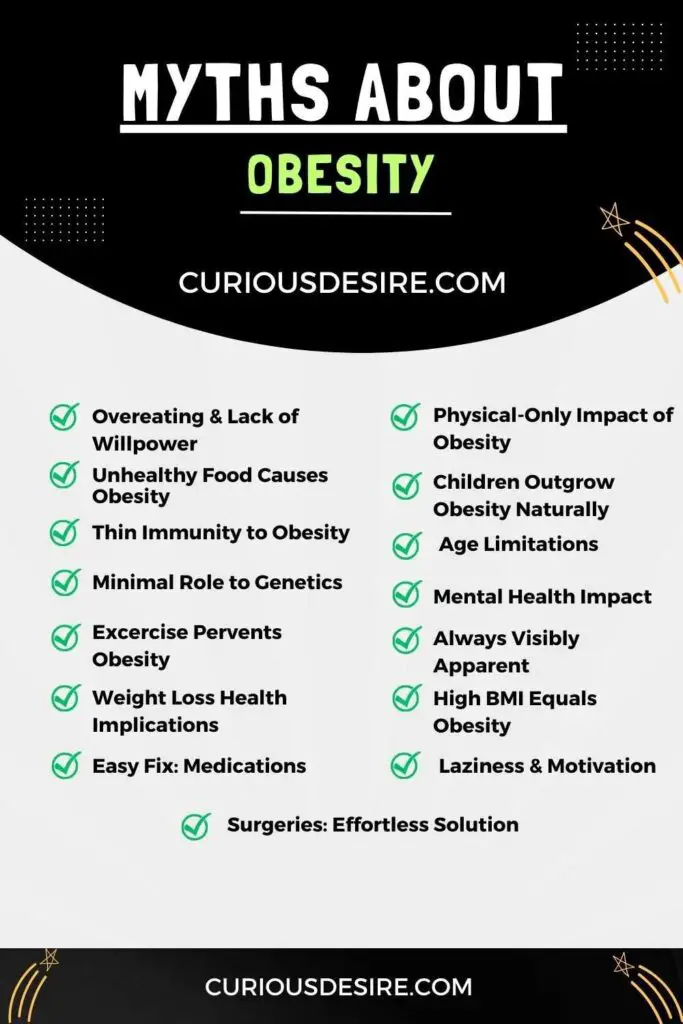
Today, there are many wrong ideas about obesity that affect how people see this health problem. Even though there’s a lot of research, some still believe these misconceptions, making it hard to understand weight-related issues well.
In this article, we’re explaining the top 15 common myths about eating disorders in an easy way. Our goal is to help everyone understand better and support those facing these issues.
Here are the top 5 common misconceptions about obesity.
- Obesity is solely caused by eating too much or lack of willpower.
- Only unhealthy foods lead to obesity.
- Thin people are immune to obesity-related health issues.
- Genetics play a minimal role in obesity.
- Weight loss surgeries provide an effortless solution for obesity.
Myth 1: Obesity is Solely Caused by Eating Too Much or Lack of Willpower
Why This Myth Exist:
The reason this misundertanding exists because it seems logical; when someone gains weight, it appears like they eat too much.
People often think excessive weight is just about eating too many calories or lacking self-control because that’s what they can see from the outside. It’s a simple explanation, but excessive body fat is much more complex than just eating too much.
Debunking The Myth:
Debunking the myth that weight challenges is solely caused by eating too much or lack of willpower involves understanding various factors:
Factors Contributing to Obesity Beyond Overeating:
- Genetics: Family history and genes influence how the body stores fat and regulates appetite.
- Metabolism: Differences in metabolic rates impact how efficiently the body burns calories.
- Hormones: Imbalances can affect weight regulation and fat storage.
- Environment: Access to healthy foods, socio-economic factors, and built environments influence eating habits and physical activity levels.
- Psychological Factors: Emotional eating, stress, depression, or trauma can lead to overeating.
What Causes Emotional Eating:
- Stress: Emotional stress triggers the release of hormones that can increase appetite.
- Emotional Triggers: Feelings of sadness, loneliness, or boredom often lead to seeking comfort in food.
- Past Experiences: Associating certain foods with comfort or reward from childhood or previous experiences.
https://www.youtube.com/watch?v=F0tRbj9fpGQ
Myth 2: Only Unhealthy Foods Lead to Obesity
Why This Myth Exist:
This belief likely to exists because it’s easier to see and understand the link between junk food and weight gain.
People often believe only unhealthy food causes weight-related issues because it’s more visible when someone regularly eats foods high in fats and sugars. However, obesity involves many factors beyond just the type of food eaten.
Debunking The Myth:
Portion sizes, even of healthy foods, can contribute to weight gain when consumed in large amounts. A sedentary lifestyle, characterized by a lack of physical activity, is a significant factor in high body mass.
Genetic factors play a role in how the body stores fat and burns calories, contributing to variations in metabolism. Hormones influence appetite and fat storage, impacting body weight.
Environmental factors, such as access to healthy foods and neighborhood walkability, along with socio-economic status, influence eating habits and weight. Stress and emotional eating, triggered by emotions, can lead to overeating, irrespective of the type of food consumed.
Myth 3: Thin People Are Immune to Obesity-Related Health Issues
Why This Myth Exist:
This misconception are likely to exists because thinness is often associated with good health. People believe thin individuals are safe from weight-related issues because they visibly appear to have lower body fat.
However, health risks can exist irrespective of body size due to factors like diet, exercise, and genetics.
Debunking The Myth:
Thinness doesn’t assure good metabolic health, as thin individuals may have high body fat percentages and poor metabolic profiles. Body composition is important; being thin doesn’t guarantee low body fat or healthy fat distribution, posing potential health issues.
Unhealthy eating habits and a sedentary lifestyle can impact health irrespective of body size. Genetic factors play a role, influencing metabolic health and predisposing thin individuals to health issues.
Hidden fat around organs, causing inflammation, is a concern even among thin people, highlighting the complexity of metabolic health beyond outward appearance.
Myth 4: Genetics Play a Minimal Role in Obesity
Why This Myth Exist:
Existence of this misconception is because some see excessive weight as solely about eating habits and exercise, overlooking genetic factors.
People might believe this because it’s easier to link weight gain to visible lifestyle choices rather than considering the complex influence of genetics on metabolism and fat storage.
Debunking The Myth:
Scientific research consistently demonstrates that genetics significantly impact a person’s susceptibility to overweight condition, challenging the belief that it plays a minimal role. Here are key factors highlighting the strong genetic influence on weight regulation:
Factors Highlighting Genetic Influence on Obesity:
- Twin Studies: These studies reveal that identical twins, even when raised apart and having different lifestyles, often share remarkably similar body weights, emphasizing the strong influence of genetics.
- Gene Identification: Specific genes associated with metabolism and fat storage have been pinpointed, significantly affecting how the body regulates weight.
- Family History: Obesity commonly runs in families, indicating a robust genetic component in predisposition to weight gain.
- Epigenetics: Environmental factors can interact with genes, impacting weight gain and contributing to an individual’s susceptibility to unhealthy weight.
- Rare Genetic Disorders: Certain uncommon genetic conditions directly lead to excessive body fat, serving as evident examples of the significant role genetics play in weight management.
Myth 5: Exercise Alone Is Enough to Prevent or Cure Obesity
Why This Myth Exist:
Existence of this misunderstanding is due to the reason that exercise is often seen as the solution to weight loss. People believe this because it burns calories and improves health, making it seem like the ultimate fix for weight-related health.

Debunking The Myth:
While exercise is important for health, it alone isn’t sufficient to prevent or cure obesity. Scientifically, weight management involves more than just physical activity.
Studies show that relying solely on exercise for weight loss might not yield significant results because it can increase appetite and doesn’t address other important factors like diet, genetics, and overall lifestyle.
To effectively manage weight-related issues, a balanced approach combining regular exercise with healthy eating habits and lifestyle changes is necessary.
Myth 6: Weight Loss Inherently Improves Health, No Matter the Method
Why This Myth Exist:
This belief likely to exists because losing weight is often linked with getting healthier. People believe this because reducing pounds can lead to positive changes in health markers like blood pressure and cholesterol.
However, the method used to lose weight and overall lifestyle changes are critical factors impacting health beyond just the number on the scale.
